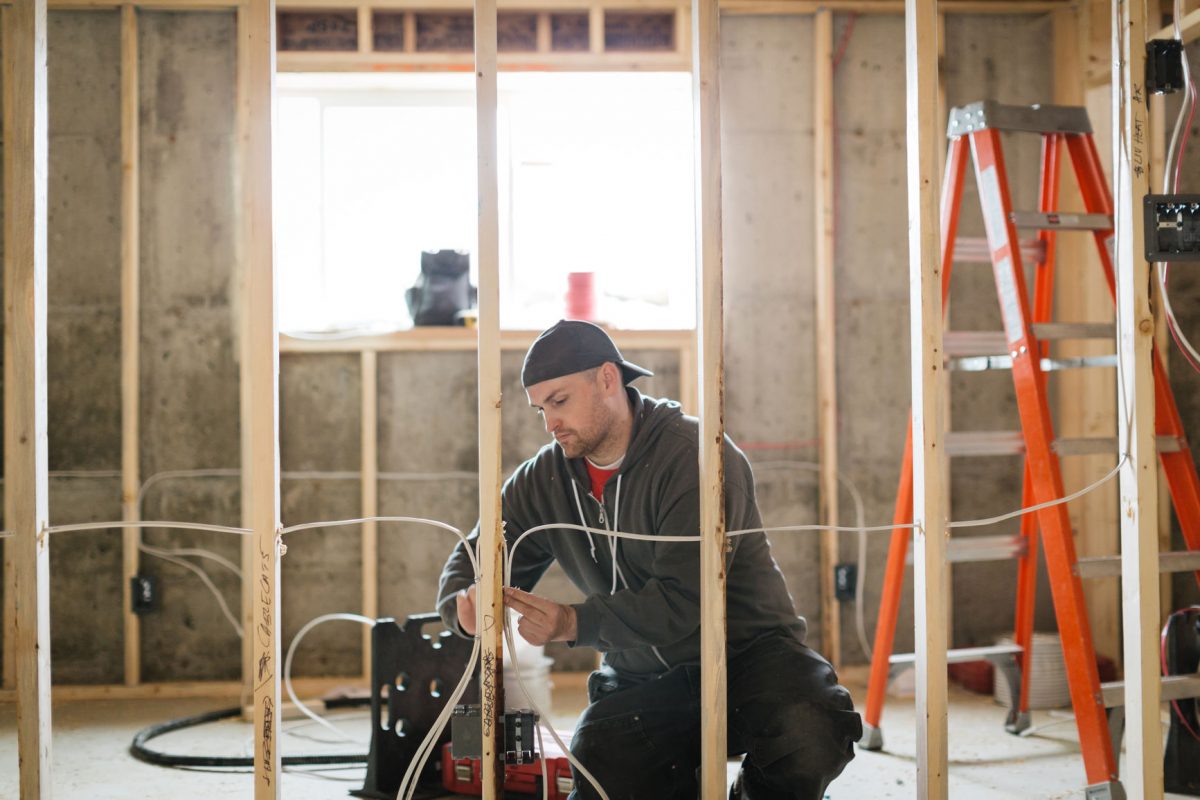
You can look at electricians as the gods of power. Electricians are responsible for keeping the American grid intact. From residential power lines to phone lines and every type of wire in between, we can thank our electricians for keeping our country powered day in and day out. But being an electrician isn’t always easy. It requires a lot of technical skill, logic, and hard work. And it requires dedication, too, especially if they work on-call and a tree decides to come tumbling down across power lines in the middle of the night.
If you run a home service business that utilizes electricians, you want to make sure you have dependable, knowledgeable, and trustworthy employees working for you. Quality electricians are sometimes hard to come by, which is why you need to know how to recruit only the best electricians in your area.
Writing a good electrician job description
Finding the right electrician begins by crafting a perfect electrician job description. Those looking for an electrician career are going to start their search by looking at electrician job descriptions. A description that is poorly written or has little information may push top-tier electricians away. To create a flawless electrician job description, take a look at our sample below and use it as a template when constructing your own. This guide on writing an electrician job description will also cover important questions to consider and other relevant information. So, continue reading for a thorough understanding, or jump around to various sections using the links below.
What makes a good job description?
A job description outlines a variety of tasks that are performed in that specific role, such as job responsibilities, qualifications, and requirements, as well as information on how to apply and benefits that come with the job. The 2014 Kelly Global Workforce Index found that 17 percent of job seekers said a clear job description and requirements had a positive effect during their job application process. Without a clear description, job seekers may get confused about the duties of the role, or may end up applying for a job they are not qualified for.
Not only does a poorly written job description frustrate job seekers, but they can also cost you your own time as well. If your electrician job description isn’t clearly articulated with every responsibility, duty, and qualification, you may spend a large chunk of your time interviewing unqualified candidates. Or, you may even hire a candidate who ends up being a poor fit for your business, which can hurt your company.
Tips for writing a job description for an electrician
Each type of electrician job description will vary because no one company is the same. Your company is its own unique entity, which is why you should use this electrician job listing template as a guide, rather than a set-in-stone document. This template, however, will help you generate leads and find prospective electricians who are motivated, ready to work, and eager to help grow your team. Filling an electrician job placement can be tough, but with this job description template, you’ll have applications coming in the mail (or your inbox!) in no time.
Below are common sections found on electrician job descriptions and what information should be included. However, as you create your own job description, feel free to add additional sections or information that is relevant to your business.
The different parts of a good job posting
Job description
We are (or insert company name) a local residential home service company looking for a qualified, motivated, and knowledgeable electrician to join our growing family of home service professionals! This opening is a permanent, full-time, benefits-eligible position that is non-exempt under the Fair Labor Standards Act, and eligible for overtime compensation.
The work schedule is Monday-Friday, 8:00 a.m. to 4:30 p.m., however, some weekends and evenings may be required. Additionally, we equip all of our electricians with the necessary tools and equipment, as well as a service vehicle and cell phone, to assist with job duties. If you’re looking to be a part of a friendly team of dedicated professionals, apply today!
Job responsibilities
As an electrician with our company, you will be responsible for a variety of duties pertaining to the installment, diagnosis, and maintenance of electrical parts. Additional electrician requirements include:
- Using testing devices to determine the cause of an electrical problem
- Assembling, installing, testing, and maintaining electrical equipment such as wiring and appliances
- Using a variety of tools to install and assemble electrical wires, appliances, or equipment
- Understanding how to read and interpret blueprints and diagrams
- Using troubleshooting techniques to identify electrical problems
- Repairing or replacing outdated or faulty electrical wires, equipment, or appliances
- Being aware of electrical hazards
Qualifications and requirements
Along with an understanding of the electrician requirements, you must also meet the following qualifications and technical requirements:
- High school diploma or GED
- Authorization to work in the United States
- Valid driver’s license
- Completion of a journey-level training and apprenticeship
- Degree in electrician from a technical college
- Prior experience working as an electrician
- Pass a substance abuse test
- Ability to lift, carry, and push a minimum of 50 pounds, unassisted
- Ability to communicate with a team
- Applicable electrical license required by the state you operate in
- Willingness to work overtime
- Perfect color vision to accurately identify wires
- Good hand-eye coordination, physical fitness, and balance
As an electrician with our company, you will be responsible for reporting directly to the lead electrician or project supervisor.
Typical benefits
We (or company name) provide a generous benefits package to all of our employees that contributes to your overall compensation. As an electrician, you will receive:
- 401(k) plan with employer matching
- Paid vacation and holidays
- Paid sick leave
- Company subsidized dental, health, and vision insurance
- On-site training programs
- Use of company service vehicles with gas reimbursement
- Tool buying program
- Company cell phone and laptop
How to apply steps
If you’re looking for an electrician job with us and meet the electrician requirements, please submit a resume and cover. In your cover letter, please provide an answer to the following questions:
- Why are you interested in becoming an electrician with us?
- What electrician experience do you have?
- What was the most demanding project you’ve worked on and how did you overcome it?
- Do you have experience with various electrical systems? If so, which ones?
Equal Opportunity Employer example
We are an equal opportunity employer and we do not discriminate against applicants on the basis of race, gender, color, religion, gender identity or expression, sexual orientation preference, disability status, protected veteran status, national origin, marital status, age, medical condition, pregnancy, or any other characteristic protected by law.
How to hire an eletrician for your business
Now that you understand how to create a thorough electrician job description, it’s time to understand how to hire an electrician looking at the specific skills and qualifications an electrician should have. Below, we’ll go over what types of electricians there are, the skills electricians should have, and the qualifications they need in order to work for your company.
What types of electricians are there?
Electricians aren’t one-size-fits-all. While many electricians hold unconditional knowledge of electrical theory and frameworks, working on transformers and power lines is much different than working in residential homes. Electricians can typically be categorized into four areas, including residential electricians, telecommunications electricians, inside electricians, and outside electricians.
Residential Wiremen: These electricians are the ones who work on homes. Residential wiremen are responsible for bringing electricity into homes to power appliances and other equipment from the point of entry.
Telecommunications Electricians: These electricians are responsible for installing, running, and testing wires that deal with different forms of communication. Telecommunications electricians ensure all computer, phone, and networking wires operate smoothly to keep everyone connected.
Outside Linemen: These electricians are the ones you see in boom lifts repairing telephone wires. Outside linemen have the difficult job of bringing electricity from power plants to your home and buildings.
Inside Wiremen: These electricians are similar to residential electricians, in that they typically work inside apartment complexes, industrial buildings, schools, factories, airports, and other types of buildings. Inside wiremen are specialists in connecting electrical systems to outside power sources.
What are the general skills required to be an electrician?
According to The Associated General Contractors of America 2018 Workforce Survey, 60 percent of construction contractors had difficulty hiring electricians. And, the Bureau of Labor Statistics projects that the electrician job market will grow by 9 percent by 2026. And, electrical job openings vary by state, so depending on where you conduct business, you made have less access to electricians compared to other states. With a shortage of electricians and a need for more, you might find yourself scrambling to find a qualified candidate. Unsure about the licensing requirements for your state? Click here to find a state by state guide to electrical licensing.
However, creating a thorough electrician job description that outlines the general skills and duties will bring more prospective candidates to your door. On your electrician job description, you may want to include these duties to ensure only the best electricians apply for your job:
- Identify and diagnose electrical problems
- Use a diagram or blueprint to locate panel boards, outlets, and circuits found within a house, building, or structure
- Installing, maintaining, and restore or replace electrical devices such as wires, circuit breakers, fuses, security systems, fire alarms, and telecommunication systems such as phones, intercoms, computers, and more
- Test various electrical systems
- Properly document all repairs, maintenance, and installation
- Troubleshoot electrical problems
- Know how to identify faulty and dangerous wires and replace them
- Understand how to trace the flow of electricity
- Know how to safely use power and hand tools
- Have the ability to create a layout of electrical wiring, systems, fixtures, and equipment and install them
- Adhere to safety standards outlined by the National Electrical Code
- Have a thorough understanding of circuit schematics
- Ability to report to duty on time consistently and be dependable
What qualifications should my business look for in an electrician application?
Depending on the type of electrician you are hiring, the necessary qualifications may vary. However, those looking for electrician careers should have the same foundational knowledge across the board. Whether it’s a home, office building, park, or shopping center, proper electrical wiring and is needed in order to ensure everyone is safe. Because electricity in itself is extremely hazardous, you want to ensure the homes or buildings you’re working on have only the best safety standards, so no one gets hurt.
That’s why it’s important that you hire a qualified electrician that knows the risks that come with electricity, and how to take preventative measures to keep both employees and consumers safe. All electricians must complete secondary training and an apprenticeship, which is typically done through a trade school.
According to the Independent Electrical Contractors Association it typically takes between 4 and 5 years to complete an apprenticeship to become a journeyman electrician. These years include 8,000 hours of paid on-site training, as well as 576 hours of classroom instruction in certain courses such as electrical theory, first aid and CPR, and residential, commercial, and industrial wiring.
Additionally, electricians are always required to pass state licensing exams. Each state has its own requirements, which the National Electrical Contractors Association outlines on its website. However, most questions on the state exams are based on the National Electrical Code (NEC). The NEC, state, and local codes all set standards to ensure electrical wiring and equipment is installed safely.
Finally, all electricians should have a high school diploma or GED, a valid driver’s license and clean driving record, and additional skills such as physical strength, troubleshooting skills,communication skills, and proper color vision.
Consider the education and years of experience
When it comes to hiring an electrician, you don’t want to jump the gun and hire someone out of desperation. This can lead to an abundance of problems, such as the employee having no working knowledge of electrical theories, or hiring an employee who doesn’t have the mandated experience for being an electrician. As you comb through the applications coming in the mail or your inbox, keep an eye on their educational history. Below, you’ll find examples of what ideal electricians will have under the education section of their resume.
Primary Education
- A high school diploma, GED, or equivalent
- Classes that focus on science, technology, engineering, and math (STEM)
- Additional courses should include physics, chemistry, algebra, and mechanics. Some high schools even offer workshop and mechanics classes, which is something to look for
- An Associate’s degree or Bachelor’s degree from an accredited institution. Look to see what classes the candidate took that may pertain to electrical work
- Look for courses related to electrical theory, electrical engineering, electrical protection and control systems, and more
On-Site Training
As previously mentioned, electricians must complete a paid apprenticeship that lasts 4 to 5 years, which 8,000 hours of on-site training and 576 hours of in-class instruction
Popular apprenticeship programs include:
- The Joint Apprenticeship Training Center between the International Brotherhood of Electrical Workers and the National Electrical Contractors Association
- Independent Electrical Contractors Apprenticeship Program
- U.S. Department of Labor Apprenticeship USA Program
Professional Certifications
- Professional certifications vary by state. However, most certifications are based on the National Electrical Code
- Certifications by state can be found on the ElectricianSchoolEDU website
Common mistakes when hiring
Hiring the wrong employee can cause more harm to your company than you think. An electrician job is no joke, which is why you want to ensure you hire a professional, knowledgeable, and dedicated staff member. There are many hiring mistakes you can make as a field service business owner, which is why it’s important to be proactive and know what not to do when hiring an electrician. In our article 5 Hiring Mistakes Field Service Business Owners Make, we cover common hiring mistakes and how to avoid them. These mistakes can even be applied when trying to hire an electrician. The 5 mistakes go as follows: 1. Hiring someone just because they’re family 2. Using a generic job description 3. Skipping over the technical test 4. Focusing only on technical skills 5. Overlooking the value of culture fit
So, as you begin to search for qualified candidates, keep these mistakes in mind. The last thing you want is to awkwardly fire a family member because they don’t know how to set up electrical equipment properly, or hire an outsider who looks good on paper but doesn’t fit in well with your team.
How much should do electrician get paid?
Lastly, you want to offer a competitive price to attract top-tier candidates. With a predicted labor shortage of about 60,000 electricians by 2026, the demand for electricians will be on the rise. What’s the best way to secure a quality electrician? Money. Sadly, no one works for free, so if you want to hire an electrician, you’re going to need to provide a competitive salary before a competitor snatches them up.
The Bureau of Labor Statistics reports that the average annual salary of an electrician iAmerica is $55,190. However, different industries paid different salaries. For example, electricians employed by the government made an average annual salary of $62,110, electricians employed through an employment service made an average annual salary of $48,500.
The National Center for Construction Education and Research breaks down the average annual salary of electricians a bit further in their 2018 Construction Craft Survey Salary. Their results concluded that the average annual salary for a commercial electrician was $61,139, while the average annual salary for an industrial electrician was $67,269. Additionally, a power line operator’s average annual salary was $68,262, while a power generation technician’s average annual salary was $63,024.
As you can tell, the average salaries of electricians vary on the industry the electrician works in, and also vary by state. Depending on your line of work and the type of electrician your home service business needs, you may need to shell out a large sum of money in order to get a qualified electrician.
Takeaways
Creating an electrician job description is no easy task. From outlining all of the required duties an electrician should have, to listing the qualifications needed to work, there’s a lot of information that goes into a thorough job description. However, it’s important to be articulate and to clearly state all that you expect from a potential candidate, as any broadness in your descriptions can lead to a misunderstanding.
Using the examples we’ve provided above, you’ll be able to post a job description on a job listing site or in your local paper. Posting your electrician job description on numerous websites will provide more access to potential candidates, giving you a larger pool of electricians to choose from. Remember, as you read through each application, resume, and cover letter, ensure they completed their apprenticeship, hold the correct licenses and certifications required by your state, and fit in well with your company culture.








